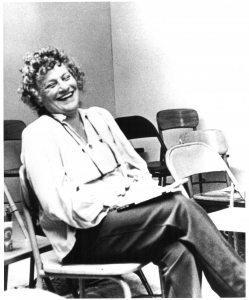Solving my “Shut-Off”
“My work is not Psychodrama!! Never use your own tears! Use the character’s tears!”
Viola proclaimed this very emphatically when we would try to work out our personal problems in a scene. Some actors in our workshop were trained to use ‘sense memory’ and transfer the sadness of a personal event to find the emotional equivalent in a scene. This would drive her crazy. “My work is not about Memory! Memory is in the head. Memory is the past! This is about right now!”
She’d also eschew anyone who idealized the spiritual aspects of her work and the liberating effect the games had on people personally. Some students would consider her workshops a kind of therapy. It was a no-brainer that self-improvement junkies would gravitate to this work because it did work at that level, but Viola knew never to make it a primary focus in her work.
“My work appeals to the Misty-Moisties” she’d tell me. She had little patience for people using her games to reach enlightenment or some other personal goal. “Don’t get misty-moisty! – Play the game!”
For several years in class, I had a particular problem Viola tried to solve. I often ‘shut off’ while improvising. Not that I would stop improvising, but I had a way of occluding what other players were up to and I would stand back (in my mind) to get my bearings and then try to get back into the scene. I shut myself off from being fully affected by my fellow players often and held myself a little apart.
Obviously, this was due to my upbringing in a chaotic family with a narcissistic mother who dispensed only conditional love and often contempt for us. Added to that, my father was a manic-depressive (now called bipolar disorder). It was dangerous to be vulnerable to the onslaughts of neglect (at its best) and anger (at its worse) so to preserve my sanity and self-respect, I relied on my own resources for self-love and care. Now that I was an adult, out in the real world, I had no experience allowing others to deeply contact me emotionally. Shut-off was how I survived my childhood. I relied solely on my own resources for love and affection and because it came from within, I had control of it. And as we know, controlling one’s behavior is very non-intuitive. I later found this out in therapy.
Viola would select Part-of-a-whole games for me and I’d be able to join in when not in a scene improv, but when I got involved in a relationship scene, I had a way of sticking to myself while playing with others. I could not get involved in the emotional uncertainty of feeling things like empathy, love and even anger. I could handle situations as long as personal relationships remained superficial for the most part. I needed the safety of predicting emotions and mistrusted the deep waters of emotional vulnerability and connection.
She called what I did “Shut-off”. Now Viola was not one to do any kind of psychoanalysis or psycho-drama. Her work was about something else. But she acknowledged my behavior and sought to solve the problem in pursuit of being able to give me more capacity to improvise. At the time, I was not aware of this problem so acutely.
I’d be busily working on the focus in a particular scene and I’d hear Viola coach various things: “Use your where!” “Play the game!”
“Go with what’s going on!” “No Urgency! Sloowww Motionnnnnn!” all coaches I could adopt and many saved my bacon on different occasions as I made my way through a scene.
Sometimes she’d also throw in a phrase like, “Notice if you’re shutting off!” then add “Don’t do anything about it. But don’t not do anything about it.” This is the essence of side-coaching. It’s a paradox. You’re telling someone to do something, but also allowing them not to act on it at the same time keeps you from forcing them to face it. You’re alerting them to the problem and sometimes that’s all you can do. Helping them by doing something else is damaging to you as a coach. Showing them how cheats them of the inevitable self-discovery and analyzing it only keeps it in the head, and it only keeps them focused on their inability to solve it for themselves.
I’d like to tell you that it worked and Viola’s side-coaching genius cured me, but it’s not the case.
But here’s the thing. She didn’t belabor it as I continued in workshop. Yes, she did make me aware of it. It was not her job to cure me of this, but she addressed it as a resistance and did what she could to solve it with games and side-coaches and not analysis or sympathy.
Part of doing this work with people is allowing for the different resistances, addressing them with games that might dissolve it. It’s best if you use it as a problem for you, the teacher, and contend with the problem, without rescuing anyone or treating anyone psychologically. Keep it about the work and allow each student to present their problems to you to solve via present-time play. Try to find a side-coach that might unlock that resistance. It’s a good practice for you and your students.
If you’re aware of your urge to rescue or cure or be a misty-moisty, be aware of it and don’t do anything about it, but don’t NOT do anything about it.”
